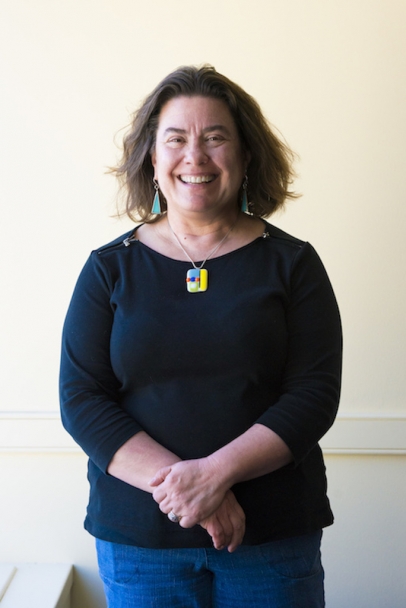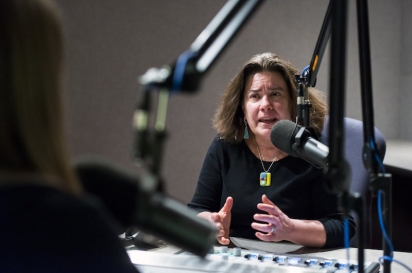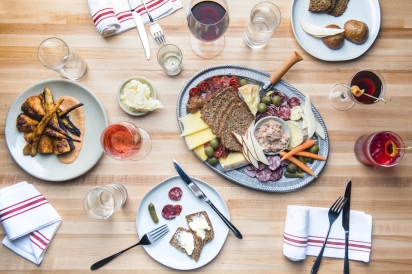From Plate to Page
My mother was the kind of cook who seldom used a recipe. An artist by passion and inclination, she treated cooking as an extension of that creativity. A first generation American of Armenian heritage, the youngest of eight, she grew up on a 40-acre truck farm in southern Massachusetts. And she fed my brother and me the foods of her childhood: lamb and green bean stew, stuffed peppers and squashes, homemade yoghurt, shish kebabs, bulgur pilaf. Oh, we got more “American” fare too; hamburgers and pork chops, roasted chickens and mashed potatoes. And the best apple pie I have ever had. I still can’t reproduce her crust, despite decades of trying.
But during her lifetime, my mother also traveled far from her childhood home. She spent time in Okinawa and mainland Japan and learned to love those flavors. She also traveled within the United States and ate the deli foods of New York, the barbeque of Kansas City, and the Chinese food of San Francisco. While I don’t remember eating specific dishes from any of those cuisines when I was a kid, all of her travel experiences went into her cooking. I credit her with broadening my palate before I had any idea that was what she was doing.
Ann Christenson, Carol Deptolla, and Lori Fredrich are not chefs. They don’t own or manage any restaurants, and while they all cook (when they have the time), very few of us will have the pleasure of sitting at their dining tables. But through their writing, these three women do for the city what my mother did for me all those years ago: They broaden our palates. They introduce us to new foods or dining trends, they revisit old standbys to remind us of why we first loved them. They individually and collectively champion — and critique — the eating experiences that make Milwaukee. They connect us with our food scene in a fundamental way.
Milwaukee is lucky to have them – it’s still rare to have three of the major media voices around food be female. For a long time, men have dominated the restaurant world. Men were the chefs, the wait staff and the sommeliers. For every Julia Child, there were many more Auguste Escoffiers, James Beards, Mario Batalis, Anthony Bourdains, and Jacques Pépins. There still are.
The same could be said for those who wrote about our food. Again, for every Ruth Reichl, Mimi Sheraton, or Frances Moore Lappé, there were many more Frank Brunis, Jay Rayners, and Michael Pollans.
All of this has been changing over the past couple of decades, of course, although perhaps not as quickly as some would like. There are more women now who are executive chefs, although still mostly in restaurants they also own. There are also more women who are writing about food as critics, cookbook authors, and as food and culture commentators: think Nigella Lawson, or Giada De Laurentiis, or Cat Cora.
None of the women who make up what I think of as the three-legged stool of Milwaukee food writing claimed any special knowledge or insight into food or dining because they are women. And none of them thought they approached their jobs any differently because of their gender. But all three, when I brought it up in our conversations, thought it was an interesting thing to think about. And since our view of the world is shaped by our gender as much as by our cultural background and economic or social status, it’s probably fair to say their female sensibility plays at least some part in their perception of food and how they write about it. But in what way is anyone’s guess.
Lori Fredrich
Lori Fredrich (http://www.lorifredrich.com) is the senior food writer for OnMilwaukee.com and the author of the 2015 book “Milwaukee Food: A History of Cream City Cuisine.” Unlike Deptolla and Christenson, she is most emphatically not a critic. She dines out as herself and she knows chefs and managers and sommeliers all over the greater Milwaukee area. “My entry into the restaurant world was very much through people,” she said. “Meeting people and knowing people.”
And not just meeting people but wanting to know their stories.
Over a delicious grilled cheese sandwich at Sweet Diner in the 3rd Ward, Fredrich shared that writing was her earliest passion. Food was a close second, though.
“There are stories my mother could tell about me getting cookbooks from the library and making people eat, say, kidney bean salad,” she said. “I was always looking for the weirdest thing I could make — or that sounded weird to me.”
Fredrich has only been writing full time about Milwaukee’s food scene for the past couple of years, but she’s been aware of it for the past couple of decades. Before she went full time at OnMilwaukee, her day job was in marketing and communication at Marquette University. But a food blog she kept on cooking and recipes gained national attention and helped her land some freelance writing gigs here. The OnMilwaukee freelancing began in 2010 and in 2016 she went full time.
She also did a lot of recipe development, working for the Wisconsin Milk Marketing Board and The American Butter Institute, among others. There was even an online column for Milwaukee Magazine (before she started with OnMilwaukee) for a couple of years that focused on food stories that other writers weren’t writing about: “Little ethnic grocery stores, people launching small businesses, like Indulgence Chocolatiers, who were working out of a little warehouse in Waukesha. Or Purple Door Ice Cream when they were in a really small shop…”
But what really helped Fredrich transition into a full-time food writer was A) she is a self-described “very broad eater,” which makes her willing to taste just about anything once, and B) a pact she and her husband made with each other to really get to know Milwaukee.
“We kept talking about moving, but for a variety of reasons that didn’t happen,” she said. “So I said, you know, let’s lay down roots here, then, and get to know the city. And in doing that one of my pursuits was to find the hidden gems.”
So when the formal job of senior food writer for OnMilwaukee.com became a reality in 2016, what was the niche she was trying to fill?
“We had a lot of conversations about it,” Fredrich said. “We had two dining critics already in this city and as a secondary piece I was already pretty well connected, I knew people personally. It was part of what made my job efficient. Those relationships and the ability to meet face to face was important to me.”
Fredrich is emphatic that there is still a place — and a need — in media for the traditional dining critic. Criticism pushes restaurants to do better. But there is also a place for someone who knows food well to offer their experience and their perspective — someone to tell the backstory of the dish or the business; the bigger story of food in our city.
“I love talking to a chef about the thinking that went into the food,” she said. “My stories are about the people behind the food and what the food is.”
What she really does, Fredrich said, is showcase Milwaukee’s restaurant scene: “Here’s what’s there, does that sound good to you? Go and explore it.”
And then it’s up to us, the prospective customers, to do just that. Or as Lori exhorted: “Go everywhere in the city!”
Carol Deptolla
Carol Deptolla would agree we should go everywhere (as would Ann Christenson, whose turn it will be shortly). Get out and try something new or reacquaint yourself with something that’s been around for a while.
Deptolla goes out to eat for work almost every day as the dining critic for the Milwaukee Journal Sentinel. She often will have two dinners in an evening during her busy season, and she’ll often return to an establishment three or four times, at different times of day and days of the week, to get as full a picture of the food, service, and ambiance as she can before she writes her review. She dines anonymously and in disguise (in the grand tradition of dining critics), the idea being you get a truer picture of the whole experience when the restaurant owners and workers don’t know you’re there. So she and I didn’t meet at restaurant, or at all, to talk — we spoke over the phone to safeguard her identity.
Deptolla has been in her role for a decade. She applied for and got the job after the previous critic, Dennis Getto, passed away in 2007. Before that, during the early to mid-2000s, she would write for the food section when she could while working on the paper’s county desk.
Deptolla said when she took over the critic’s role at the paper, the restaurant scene here was very different — influenced in part by the effects of the 2008 recession.
“There weren’t as many restaurants as there are now and probably not the variety,” she said. But that has most definitely changed.
“Occasionally there’s a week when a restaurant doesn’t open — that I know of. And I think, ‘well, that’s unusual.’ And back then, that wasn’t unusual at all,” she said.
Deptolla thinks people are developing a greater interest in food and food culture, which has helped to drive the restaurant growth here. More people are seeing it as a career possibility and as a way to scratch an entrepreneurial itch. And then there’s the neighborhood factor.
“You know, so many parts of town have opened up,” she said. “I mean, look at Walker’s Point. That really started taking off around 2010. There were always restaurants there but that’s when the momentum really took off.” It used to be the big nights for restaurants were Fridays and Saturdays. But that’s changed too, and people’s interest in eating out more often means restaurants are full on a Monday or Tuesday night now.
“I think, ‘Don’t people cook anymore?’” Deptolla said. “And maybe they don’t. Going out to eat might not be for an experience but because it’s Monday night and I’m hungry and I go out for dinner.”
Deptolla said there are standards all critics try to touch on when they write, like how clean the place is and if the food is cooked when it’s supposed to be and raw when it isn’t. But she said the job of food critic is a really subjective one. It’s all about what she thinks is delicious or the right way to treat a customer. But having an educated viewpoint is also key to being a good critic.
“You should know something about the cuisine you’re talking about,” she said. There are lots of ways to gain that knowledge, and not all of them require working in a professional kitchen. “You know, I’ve never been a chef, I didn’t go to culinary school. But I have a lifetime of reading cookbooks like they’re novels and eating at lots of different restaurants – it’s a lifetime accumulation of knowledge. And you bring that to the table.”
Can she can ever go out to eat and not have it be work? Deptolla laughed. “I still go out to eat and copy edit menus! It’s just something that just doesn’t leave you.” But when she’s on vacation, she does try to blinker her critical eye. “I will sometimes just eat the food that’s on my own plate. And I can just sit back and enjoy and not have to pay attention to the whole room.”
Ann Christenson
Ann Christenson said it was being interested in cooking and in food that got her started. Like Deptolla, Christenson is a dining critic who keeps her identity secret when she goes out to dine. She’s been writing about food for Milwaukee Magazine for 20 years.
Christenson has been interested in and liked food from an early age, but she said said that interest didn’t come about because of how she ate as a child.
“My mom was not a gourmet cook and she died when I was young, so my brothers cooked. It was all 1970s and ‘80s convenience. Anything with a pound of ground beef and a can of cream of mushroom soup.”
So as a college student in the journalism school at Marquette, she began to work for a catering company as a way to make money during the summers. It also taught her a lot about food preparation and presentation.
At Marquette, she was attracted to critical writing, even though traditional journalism requires telling the story in an inverted pyramid style and making sure you as the reporter aren’t part of the story.
“I was comfortable with the idea of expressing my opinion,” she laughed.
So she wrote those more traditional stories, but also did film and music reviews as often as she could. Reading the work of the critics of the time — such as Pauline Kael and Reichl — helped too.
“I mean, any kind of criticism is something you could learn from – film, music, art. Plus there were some really good food writers out there,” she said.
Christenson began at Milwaukee Magazine right out of college and one of her duties was to do all the fact-checking for the magazine. That included the restaurant reviews of the magazine’s then critic, Willard Romantini. “This was the ‘90s, so there was no internet, really” she said. “You had to pick up the phone and call these people. So I was talking to all these restaurant owners and chefs and I learned so much from them.”
Christenson said the opportunity to start writing actual food criticism for the magazine happened when Willard moved on to television. But her editor at the time told her she needed more education first.
“I was told I needed to take classes in cooking, to read the best food writing there was. I had to be around people who cooked and I had to go to good restaurants as often as I could.”
It all worked, because she was able to take over the dining beat in 1997 and she’s been doing it ever since.
Christenson said writing a good review is not just a laundry list of what’s in a dish – it’s about much more.
“It’s about the experience of dining, the types of feelings it creates in the diner,” she explained. “Obviously I can’t write these Proustian-type pieces every time, but I think to get at that “thing” — it’s almost this elusive feeling — that it stirs in someone when you go there.”
“I think people want something that makes them feel comforted, that makes them happy. That makes them feel nourished, yeah, but nourished in ways beyond hunger. When the world is as crazy as it is, there’s something about sitting down to a meal. It’s like therapy. It’s so far beyond the food itself,” she said.
And so what is the future of criticism and food writing in a world of disappearing newspapers and magazines, and the proliferation of online reviews that have no provenance? Christenson said it’s really difficult now to find people who are doing the jobs that she and Deptolla do for their respective publications. Having an independent voice that’s not influenced by the boss or the sales department or the advertisers a rare thing. How very fortunate that Milwaukee has three such voices in Ann Christenson, Carol Deptolla and Lori Fredrich.







